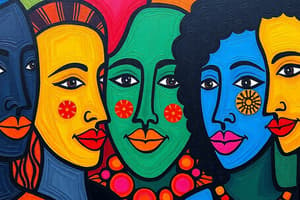Podcast
Questions and Answers
Which term has become increasingly common, according to the text, since the late 1960s?
Which term has become increasingly common, according to the text, since the late 1960s?
Ethnicity
Which of the following is not a reason why ethnicity and nationalism have become more visible in recent times?
Which of the following is not a reason why ethnicity and nationalism have become more visible in recent times?
- The rise of globalization and modernization.
- The growth of ethnic and nationalist struggles for recognition, power and autonomy.
- The influx of refugees and migrants into Europe and North America.
- The decrease in 'primordial phenomena' like ethnicity and nationalism. (correct)
- The increase in scholarly publications on ethnicity and nationalism.
The text discusses the relationship between ethnicity and race. What is the primary argument presented regarding the distinction (or lack of distinction) between these terms?
The text discusses the relationship between ethnicity and race. What is the primary argument presented regarding the distinction (or lack of distinction) between these terms?
- Both race and ethnicity are ultimately social constructs, and the lines between them are blurred, as evidenced by the 'ethnification' of some racial groups and the 'racialization' of some ethnic groups. (correct)
- Ethnicity is a more complex concept than race, encompassing both cultural distinctions and historical relationships between groups.
- Race is a social construct that is not based on biological differences, while ethnicity is a more accurate expression of group identity due to its emphasis on cultural distinctions.
- Race is outdated due to interbreeding and lack of clear boundaries between populations, while ethnicity is still a relevant and distinct concept reflecting cultural differences.
- Race refers to biological differences that are generally less important than cultural differences, which are the primary basis for ethnicity.
Which of the following is an example of a 'proto-nation'?
Which of the following is an example of a 'proto-nation'?
What is the primary issue raised by the contemporary debate on ethnic groups and national identity?
What is the primary issue raised by the contemporary debate on ethnic groups and national identity?
The author argues that anthropologists should focus on understanding the differences between 'modern' and 'primitive' societies in order to better grasp the concept of ethnicity.
The author argues that anthropologists should focus on understanding the differences between 'modern' and 'primitive' societies in order to better grasp the concept of ethnicity.
What is the primary point of comparison presented by the author regarding 'ethnic groups' and 'tribes'?
What is the primary point of comparison presented by the author regarding 'ethnic groups' and 'tribes'?
What is one of the main conclusions reached by Glazer and Moynihan regarding the American melting pot?
What is one of the main conclusions reached by Glazer and Moynihan regarding the American melting pot?
The text discusses 'native theory'. Which of the following best describes 'native theory'?
The text discusses 'native theory'. Which of the following best describes 'native theory'?
Flashcards
Ethnicity
Ethnicity
A social identity based on cultural distinctiveness, often involving perceived differences and relationships between groups.
Ethnic Group
Ethnic Group
A social group sharing a common cultural heritage and identity, often considered distinct from other groups.
Ethnic Conflict
Ethnic Conflict
Social conflict between ethnic groups, often fueled by competing interests or perceptions of difference.
Nationalism
Nationalism
Signup and view all the flashcards
Social Class
Social Class
Signup and view all the flashcards
Race (social construct)
Race (social construct)
Signup and view all the flashcards
Race-Ethnicity Relationship
Race-Ethnicity Relationship
Signup and view all the flashcards
Social Stratification
Social Stratification
Signup and view all the flashcards
Emic Category
Emic Category
Signup and view all the flashcards
Social Identity
Social Identity
Signup and view all the flashcards
Modernity
Modernity
Signup and view all the flashcards
Globalization
Globalization
Signup and view all the flashcards
Cultural Difference
Cultural Difference
Signup and view all the flashcards
Historical Depth
Historical Depth
Signup and view all the flashcards
Intergroup Dynamics
Intergroup Dynamics
Signup and view all the flashcards
Fieldwork
Fieldwork
Signup and view all the flashcards
Marxist Class Theory
Marxist Class Theory
Signup and view all the flashcards
Weberian Class Theory
Weberian Class Theory
Signup and view all the flashcards
Class Struggle
Class Struggle
Signup and view all the flashcards
Social Change
Social Change
Signup and view all the flashcards
Political Organization
Political Organization
Signup and view all the flashcards
Study Notes
What is Ethnicity?
- Ethnicity is a contested concept, commonly used in the press, political discourse, and everyday conversations.
- Similar terms, such as 'nation' and 'nationalism', also have ambiguous and vague meanings.
- Social sciences have seen a surge in publications about ethnicity and nationalism, particularly in fields like political science, history, and cultural studies.
- Concepts like 'globalization', 'identity', and 'modernity' are closely related to ethnicity and nationalism.
- Ethnicity has been a primary focus for social and cultural anthropology since the late 1960s.
- Anthropology provides unique insights, through long-term fieldwork and a bottom-up perspective, into the creation and recreation of ethnic relations in everyday interactions.
- Modern academic interest in ethnicity and nationalism stems from the visibility of these phenomena in many contemporary societies.
- Early theorists like Max Weber opposed the concept of 'ethnic community action'.
- Scholars previously thought ethnicity and nationalism would decline due to modernization.
- However, these concepts remain politically and socially important, as evidenced by conflicts from the 1990s and 2000s.
- Geopolitical conflict theories suggest future conflicts may be culturally based.
- Some examples of contemporary ethnic conflict include the Québécois independence movement.
- Nation-building is a significant aspect of current political issues in many former colonies and imperial provinces.
What is Ethnicity? Additional Points
- The influx of migrants has created new ethnic minorities in Europe and North America.
- Indigenous populations are demanding recognition and political representation in many areas
- Nationalistic movements and the potential loss of identity in the face of political unification are prevalent in discussions around European identity.
- The intersection of ethnicity with other social groups (such as gender, class, and religion) is a significant area of study.
- The relationship between race and ethnicity is complex and debated, with race frequently conceived as a negative concept of exclusion and ethnicity as a positive concept of inclusion.
- 'Race' is not a scientific concept, as evidenced by extensive interbreeding among human populations and the lack of clear boundaries in the distribution of physical traits.
- The idea of race can nevertheless be a significant cultural construct.
- Concepts of ‘race’ are heavily tied to the categorization of groups as other.
- Scholars may disagree about the separate nature of race and ethnicity, while others see ‘race’ as a subcategory of ethnicity.
- There is a significant link between ethnicity and historical and cultural factors.
Studying That Suits You
Use AI to generate personalized quizzes and flashcards to suit your learning preferences.




